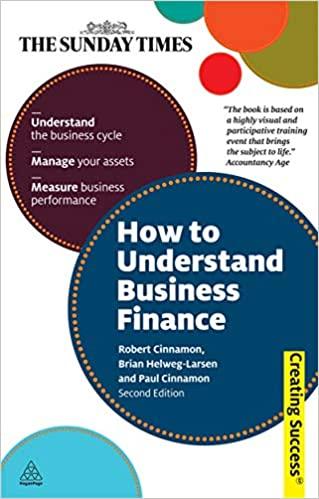Question
A. MATURITY RISK PREMIUM: The real risk-free rate is 2.5% and inflation is expected to be 2.75% for the next 2 years. A 2-year Treasury
A. MATURITY RISK PREMIUM: The real risk-free rate is 2.5% and inflation is expected to be 2.75% for the next 2 years. A 2-year Treasury security yields 5.55%. What is the maturity risk premium for the 2-year security?
B. DEFAULT RISK PREMIUM: A companys 5-year bonds are yielding 7% per year. Treasury bonds with the same maturity are yielding 5.2% per year, and the real risk-free rate (r*) is 2.75%. The average inflation premium is 2.05%, and the maturity risk premium is estimated to be 0.1 x (t -1) %, where t = number of years to maturity. If the liquidity premium is 0.7%, what is the default risk premium on the corporate bonds?
C. BOND VALUATION: An investor has two bonds in his portfolio that have a face value of $1,000 and pay an 11% annual coupon, Bond L matures in 12 years, while Bond S matures in 1 year. a. What will the value of each bond be if the going interest rate is 6%, 8%, and 12%? Assume the only one more interest payment is to be made on Bond S at its maturity and that 12 more payments are to be made on Bond L. b. Why does the longer-term bonds price vary more than the price of the shorter-term bond when interest rates change?
D. INTEREST RATE SENSITIVITY: An investor purchased the following 5 bonds. Each bond had a par value of $1,000 and an 8% yield to maturity on the purchase day. Immediately after the investor purchased them, interest rates fell, and each than had a new YTM of 7%. What is the percentage change in price for each bond after the decline in interest rates? Fill in the following table:
| Bond | Price @ 8% | Price @7% | % Change |
| 10-year, 10% annual coupon |
|
|
|
| 10-year zero |
|
|
|
| 5-year zero |
|
|
|
| 30-year zero |
|
|
|
| $100 perpetuity |
|
|
|
E. YEILD TO MATURITY: Harrimon Industries bonds have 6 years left to maturity. Interest is paid annually, and the bonds have a $1,000 par value and a coupon rate of 10%. a. What is the yield to maturity at a current market price of (1) $865 and (2) $1,166? b. Would you pay $865 for each bond if you thought that a fair market interest rate for such bonds was 12%--that is, if r (4) =12%? Explain your answer.
Step by Step Solution
There are 3 Steps involved in it
Step: 1

Get Instant Access to Expert-Tailored Solutions
See step-by-step solutions with expert insights and AI powered tools for academic success
Step: 2

Step: 3

Ace Your Homework with AI
Get the answers you need in no time with our AI-driven, step-by-step assistance
Get Started


